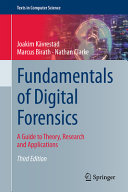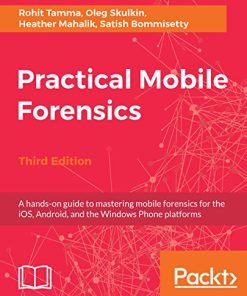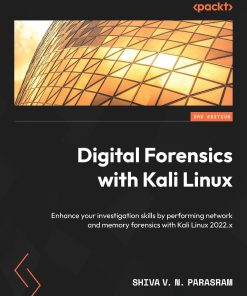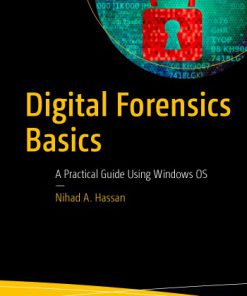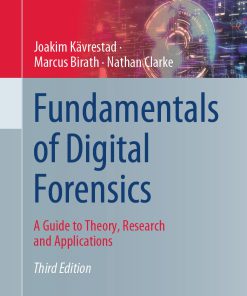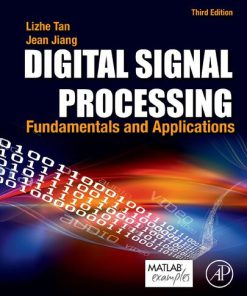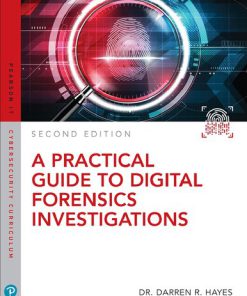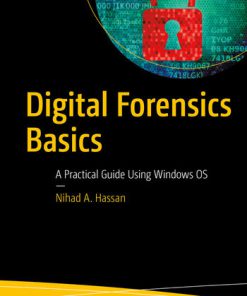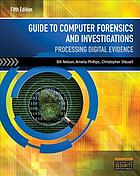Fundamentals of Digital Forensics: A Guide to Theory, Research and Applications 3rd Edition Joakim Kävrestad
$50.00 Original price was: $50.00.$25.00Current price is: $25.00.
This completed downloadable of Fundamentals of Digital Forensics: A Guide to Theory, Research and Applications 3rd Edition Joakim Kävrestad
Instant downloaded Fundamentals of Digital Forensics: A Guide to Theory, Research and Applications 3rd Edition Joakim Kävrestad pdf docx epub after payment.
Product details:
- ISBN-10 : 3031536487
- ISBN-13 : 978-3031536489
- Author: Joakim Kävrestad
This textbook describes the theory and methodology of digital forensic examinations, presenting examples developed in collaboration with police authorities to ensure relevance to real-world practice. The coverage includes discussions on forensic artifacts and constraints, as well as forensic tools used for law enforcement and in the corporate sector. Emphasis is placed on reinforcing sound forensic thinking, and gaining experience in common tasks through hands-on exercises.
This enhanced third edition describes practical digital forensics with open-source tools and includes an outline of current challenges and research directions.
Topics and features:
- Outlines what computer forensics is, and what it can do, as well as what its limitations are
- Discusses both the theoretical foundations and the fundamentals of forensic methodology
- Reviews broad principles that are applicable worldwide
- Explains how to find and interpret several important artifacts
- Describes free and open-source software tools
- Features content on corporate forensics, ethics, SQLite databases, triage, and memory analysis
- Includes new supporting video lectures on YouTube
This easy-to-follow primer is an essential resource for students of computer forensics, and will also serve as a valuable reference for practitioners seeking instruction on performing forensic examinations.
Table of contents:
Part I. Theory
1. What Is Digital Forensics?
2. Ethics and Privacy
3. Computer Theory
4. Types of Forensic Evidence
5. Decryption and Password Cracking
Part II. The Forensic Process
6. Cyber-Dependent Crime, Cyber-Enabled Crime, and Digital Evidence
7. Incident Response
8. Collecting Evidence
9. Triage
10. Analyzing Data and Writing Reports
Part III. Get Practical
11. Collecting Data
12. Indexing and Searching
13. Cracking
14. Finding Artifacts
15. Common Questions and Tasks
16. Autopsy Forensics
17. Open-Source or Freeware Tools
Part IV. Memory Forensics
18. Memory Analysis
19. Memory Analysis Tools
20. Memory Analysis in Criminal Investigations
21. Malware Analysis
Part V. Digital Forensics Research
22. Challenges and Opportunities
23. Research into the Challenges
People also search:
is a digital forensics degree worth it
is digital forensics hard to learn
is digital forensics part of cyber security
is digital forensics hard
how are digital forensics and computer forensics different
You may also like…
Computers - Networking
Computers - Internet & World Wide Web
Digital forensics basics: a practical guide using Windows OS 1st Edition Nihad A. Hassan
Computers - Other
Computers - Hardware
Cookbooks
Computers - Internet & World Wide Web
Digital Forensics Basics A Practical Guide Using Windows OS 1st Edition Nihad A Hassan
Computers - Networking
Guide to computer forensics and investigations processing digital evidence Fifth Edition Nelson


